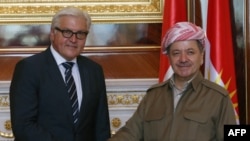The leader of Iraq's Kurds appealed to Germany for weapons to help Kurdish fighters battling militants of the Islamic State, and said foreign powers must find a way to cut off the group's funding.
The European Union on Friday gave a green light to EU governments to supply arms and ammunition to the Kurds if it has the consent of the government in Baghdad.
Germany has shied away from direct involvement in military conflicts for much of the post-war era and a survey conducted for Bild am Sonntag newspaper indicated that almost three quarters of Germans were against shipping weapons to the Kurds.
But Germany's defense minister has said the government was looking into the possibility of delivering military hardware.
Masoud Barzani, the president of Iraqi Kurdistan, said the Kurds needed more than the humanitarian aid that Germany began sending on Friday to support people forced to flee their homes by the Sunni militant group's advance.
“We also expect Germany to deliver weapons and ammunition to our army so that we can fight back against the IS terrorists,” Barzani told German magazine Focus. He said they needed German training and what they lacked most were anti-tank weapons.
Proclaiming a 'caliphate' straddling parts of Iraq and Syria, the radical Islamists have swept across northern Iraq in recent weeks, pushing back Kurdish regional forces and driving tens of thousands of Christians and members of the Yazidi religious minority from their homes.
German defense minister Ursula von der Leyen sought to temper Kurdish expectations, saying on Friday that forces in Iraq were trained on Soviet-designed weapons that Germany did not have and could not deliver.
But Foreign Minister Frank-Walter Steinmeier held out the possibility of sending more than humanitarian help.
Speaking in Baghdad on his way to the Kurdish regional capital Arbil, he said he would use talks with Barzani on Saturday to find out what more the Kurds needed, and would then decide what Germany could do.
“A terrorist murder gang is trying to conquer a country, to found its own state, a caliphate, and we fear that the last anchors of stability in Iraq could fall,” Steinmeier said.
He said the nomination of Haider al-Abadi as Iraq's prime minister-designate this week was a “small ray of hope” as it made it more possible to form a government that represents all of Iraq's regions and religious sects.
Barzani said foreign governments had to find a way to choke off Islamic State's sources of funding.
“A grand alliance must drain the IS's financial sources and prevent individuals from aligning themselves with the IS group,” he said.
“The first source of IS's income was the oilfields in Syria. Later they stole more than $1 billion from state banks in Mosul and Tikrit. They also got financial support from several other countries and donors.”
He estimated that the IS took in $3 million every day via compulsory levies and oil theft.












